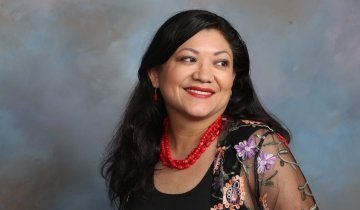If you want to elevate your career in education, an advanced degree can open the door to more job opportunities. Many schools offer graduate programs in education, but before you go down a rabbit hole of research, first decide if you want to get a PhD or EdD degree.
A PhD and EdD in education are both doctoral degrees. The one you choose will have a significant impact on your graduate school experience, and your career as well. (Already know what you want? Visit our Admission and Deadlines and Requirements pages for more information.)
For a quick overview of differences between the two degrees, view the infographic below or download it here.

Before we explore tips to guide your decision, let’s review important context for each degree.
What is a PhD in Education?
A PhD is a doctorate in philosophy. Historically, it was the first degree offered to students in the field of education and is perhaps more well-known than the EdD.
The PhD in Education is ideal for students who are excited by a career in research. Programs train you to interpret existing theory on a subject, identify opportunities for exploration, and advance theory through critical analysis. It is not necessarily a degree that prepares you for an administrative or leadership role.
With a PhD in Education, you will become an authority on a particular topic or range of topics, and make recommendations on how practitioners should approach or implement them. Examples of research topics might include teaching practices, the effect of learning environments on student outcomes, and inequity in education.
What is an EdD in Education?
An EdD is a doctorate in education, and prepares you for a career in educational leadership. Like the PhD degree, you will learn to interpret research. However, EdD programs train you to apply the research in real-world settings.
While pursuing your EdD degree, you will study critical theory and determine how you can implement it to drive change in K–12 classrooms, universities, community colleges and other organizations. You will also reflect on your role as a leader. Top EdD programs encourage you to analyze your relationship to your research topics and work environments. The goal is to ensure that your leadership is fair and equitable for all people.
PhD vs. EdD: What are the main differences?
The table below summarizes the key differences between a PhD and EdD in education:
| PhD Degree | EdD Degree | |
|---|---|---|
| Career path | Education and research | Professional leadership |
| Coursework |
|
|
| Time commitment |
(in some cases, tuition is covered by graduate assistantship) |
|
| Dissertation | Yes | Yes, or dissertation in practice |
| Online modality | Offered by select schools | Offered by several schools |
PhD vs. EdD: How to choose
To help you figure out which doctorate in education is right for you, check out these nine helpful tips:
1. Follow your passion
Rather than focusing on the title of the degree, think about what motivates you. Why did you get into education in the first place? Do you want to have a direct impact on classrooms or pursue big-picture change behind the scenes? You may assume that one degree is more prestigious than another, but it’s important to choose a path that will bring you personal satisfaction that is consistent with your career goals.
2. Picture your day-to-day
PhD and EdD programs are a significant time investment. If you’re struggling to decide because both degrees sound rewarding, try picturing what your daily life might look like in each program.
A PhD in Education is decidedly more research-heavy. A majority of your study will include—but is not limited to—investigating theory and research methodologies. By contrast, EdD programs include the application of your research. Much of your time will be spent using your knowledge to solve professional challenges.
3. Explore career options with a PhD in Education
Earning your PhD in education will make you a more desirable candidate for a range of research-oriented positions. Your ability to evaluate research and make recommendations will be a valuable skill to many organizations.
Many people with PhD in education degrees secure jobs as:
- University professor
- Research scholar
- Education director
- Policy researcher
- And more
Want specific examples? For a list of positions held by recent graduates from USC Rossier’s PhD in Urban Education program (PhD), check out our Benefits and Career Paths page.
4. Explore career options with an EdD in Education
EdD programs prepare you for different kinds of senior positions. You will be eligible for leadership roles primarily in education administration, however your high-level skill-set will be desirable to certain nonprofits and businesses as well.
Position titles for professionals with an EdD degree may include:
- Superintendent
- Dean
- University or college president
- Principal
- Director of a research center
- Development manager
- Curriculum developer
5. Compare PhD vs. EdD coursework
Doctor in education programs are rigorous and challenging, and while both are rooted in research, their paths diverge. Coursework in PhD programs highlights qualitative and quantitative research methods, and gives you the tools needed to perform your own research. You will also work on your dissertation, and be required to take oral and written exams.
Additionally, PhD students typically have the chance to work one-on-one with a research faculty member on their research. As you narrow your search for a graduate school, remember to review faculty and consider opportunities for collaboration.
EdD courses in educational leadership train you to view common problems in education from multiple perspectives. Courses early in the program urge you to use research as a tool that can provide practical solutions that promote equity. As you progress, you will then take actionable steps to address a problem of practice.
6. Review PhD vs. EdD specializations at different schools
You want to choose a university that aligns with your personal interests. Start by reviewing schools’ mission statements. Do they seem principle-driven or focused on ushering you through the program? You also want to check out the concentrations offered by each program. Select a program that is going to let you explore issues and challenges that matter to you.
Concentrations vary by university. For example, some concentrations may include educational leadership in K–12 schools, educational psychology or higher education. Expect universities located in or near cities to offer concentrations exploring urban education settings as well.
7. Consider PhD and EdD online programs
If you’re a working professional and don’t want to commute to a physical campus while you earn a degree, an online doctor of education program may be right for you. Online programs cover the same information as their in-person counterparts, but offer a little more flexibility for students.
However, classes such as those included in USC Rossier’s Doctor of Education in Educational Leadership online program are held live, meaning you are required to attend the online class at a specific day and time.Note: It may be easier to find online options for EdD than PhD programs.
8. Research PhD vs. EdD dissertation requirements
A traditional part of a PhD in education is the dissertation. Dissertation requirements vary by program and school, but generally include thorough investigation of a topic from multiple angles, copious research, and an exam to defend your written work once it’s completed.
By contrast, some EdD programs require you to complete a dissertation in practice. Using research methods learned in the program, you will attempt to resolve a problem in education dealing with equity and access. You may also have the chance to work alongside a group of students and an advisor to tackle the problem. In addition to the different requirements of PhD and EdD dissertations, individual schools may want you to explore issues that fall within their philosophical focus.
9. Estimate your time commitment
Before committing to a doctorate in education program, make sure you understand how much time it will take. A PhD in Education typically requires four to six years to complete, while EdD programs take three years, and may be completed while you work.
Additionally, some PhD programs are full-time commitments. Because of the workload, you can’t work a full-time schedule. However, your tuition is covered by a graduate assistantship. A Master’s degree may also not be necessary for acceptance into a PhD program.
USC Rossier resources
If you’re still unsure about which doctorate in education is right for you, we’re happy to provide personalized guidance.
You can also use USC Rossier’s simple career survey tool.
Curious about the requirements for our doctoral programs? Check out the list of program comparisons. As a school that has offered doctoral degrees for 100 years, USC Rossier is uniquely positioned to provide insight and expertise on doctoral programs in education




